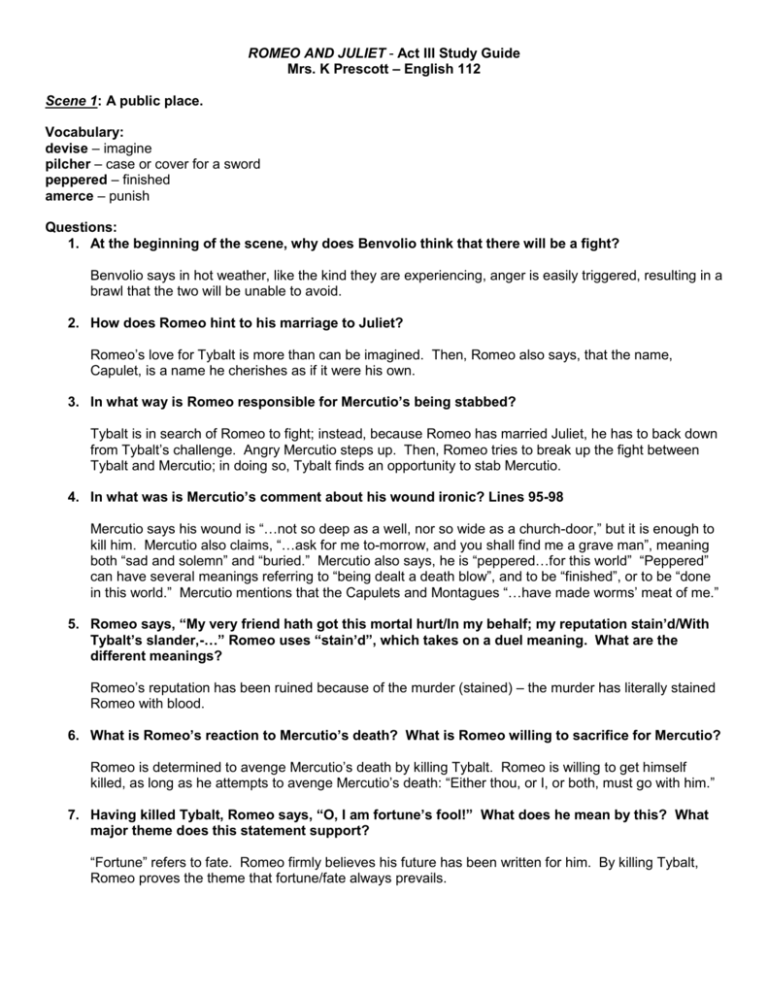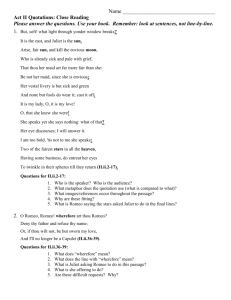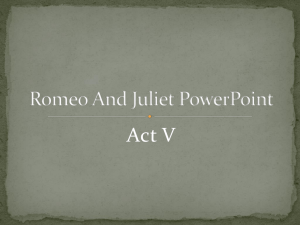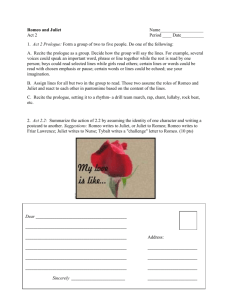ROMEO AND JULIET: Act I Reading and Study Guide
advertisement

ROMEO AND JULIET - Act III Study Guide Mrs. K Prescott – English 112 Scene 1: A public place. Vocabulary: devise – imagine pilcher – case or cover for a sword peppered – finished amerce – punish Questions: 1. At the beginning of the scene, why does Benvolio think that there will be a fight? Benvolio says in hot weather, like the kind they are experiencing, anger is easily triggered, resulting in a brawl that the two will be unable to avoid. 2. How does Romeo hint to his marriage to Juliet? Romeo’s love for Tybalt is more than can be imagined. Then, Romeo also says, that the name, Capulet, is a name he cherishes as if it were his own. 3. In what way is Romeo responsible for Mercutio’s being stabbed? Tybalt is in search of Romeo to fight; instead, because Romeo has married Juliet, he has to back down from Tybalt’s challenge. Angry Mercutio steps up. Then, Romeo tries to break up the fight between Tybalt and Mercutio; in doing so, Tybalt finds an opportunity to stab Mercutio. 4. In what was is Mercutio’s comment about his wound ironic? Lines 95-98 Mercutio says his wound is “…not so deep as a well, nor so wide as a church-door,” but it is enough to kill him. Mercutio also claims, “…ask for me to-morrow, and you shall find me a grave man”, meaning both “sad and solemn” and “buried.” Mercutio also says, he is “peppered…for this world” “Peppered” can have several meanings referring to “being dealt a death blow”, and to be “finished”, or to be “done in this world.” Mercutio mentions that the Capulets and Montagues “…have made worms’ meat of me.” 5. Romeo says, “My very friend hath got this mortal hurt/In my behalf; my reputation stain’d/With Tybalt’s slander,-…” Romeo uses “stain’d”, which takes on a duel meaning. What are the different meanings? Romeo’s reputation has been ruined because of the murder (stained) – the murder has literally stained Romeo with blood. 6. What is Romeo’s reaction to Mercutio’s death? What is Romeo willing to sacrifice for Mercutio? Romeo is determined to avenge Mercutio’s death by killing Tybalt. Romeo is willing to get himself killed, as long as he attempts to avenge Mercutio’s death: “Either thou, or I, or both, must go with him.” 7. Having killed Tybalt, Romeo says, “O, I am fortune’s fool!” What does he mean by this? What major theme does this statement support? “Fortune” refers to fate. Romeo firmly believes his future has been written for him. By killing Tybalt, Romeo proves the theme that fortune/fate always prevails. 8. Throughout this play, loyalty proves to be a determining factor for characters who have a decision to make. What is your opinion of Benvolio after he tells the Prince that Romeo is responsible for Tybalt’s death? Answers will vary. Example: Benvolio may be viewed as disloyal to his friend, Romeo. Benvolio may be viewed as loyal to the Prince. 9. What does Lady Capulet request of the Prince? Lady Capulet wants Romeo to be slain for his crime of killing her nephew, Tybalt. 10. What is the Prince’s decision? The Prince decides to banish Romeo from the city. If Romeo is seen within city limits, he is to be killed. Scene 2: Capulet’s orchard. Vocabulary amorous – passionate, loving monarch – prince, king, one ruler beguiled – fooled, seduced Questions: 1. What does Juliet mention at least 12 times in her soliloquy? Why? “night” – it is the safe time for her and Romeo to meet – it is when she gets to see Romeo and spend time with him. 2. Juliet’s first reaction to Tybalt’s murder is to call Romeo names. What does she call her beloved Romeo? The names she calls Romeo are quite obscure; what do you think they suggest? What is odd about these insults? Answers may vary. Example: “serpent heart” (he has the heart of a devil); “dragon”; “Beautiful tyrant!”; “fiend angelical!”; “Dove-feather’d raven!”; “wolvish-ravening lamb!”; “damed saint”; “honourable villain!” Juliet is confused. She has lost her cousin, Tybalt, whom she loves unconditionally, but is her true love who is the murderer. These names she calls Romeo are also confused because she is intermixing complements with insults. A “wolvish-ravening lamb” suggests that he has “wolvish” tendencies (i.e. barbaric, uncivilized, etc.), but “lamb” suggests, the lamp of God; this comment goes back to earlier scenes when Juliet professed how much she idolizes Romeo, and how highly she thinks of him. 3. After the name calling, what is Juliet’s second reaction? What does this second reaction prove? Juliet loves Romeo and realizes that Tybalt would have killed Romeo if Romeo had not killed him first. With Juliet’s realization it proves her loyalty and trust to Romeo. 4. Why does the Nurse, who is obviously fond of Tybalt, volunteer to go and get Romeo? Juliet has said that, with Romeo banished, she is going to go to her room and kill herself. The Nurse knows Romeo is the only one who can comfort Juliet during this time. Being the wonderful confidante she is, the Nurse offers to find Romeo. 5. Where is Romeo hiding? What seems to be Juliet’s plan, and what does she give to the Nurse? Why? Romeo is hiding in Friar Laurence’s cell, and Juliet wants to see him that night before he makes his final exit from the city. Juliet gives the Nurse a ring to deliver to Romeo. This ring signifies to Romeo that the message is from Juliet and that she does not blame him for Tybalt’s death. Scene 3: Friar Laurence’s cell. Vocabulary: affliction – agony, depression, grief mangle – wound digressing – departing, diverging, drifting Questions: 1. What is Friar Laurence’s reaction to Romeo complaining? Friar Laurence is disappointed with Romeo’s reaction because, by law, Romeo should be put to death for the crime committed. Instead, the Prince has spared Romeo’s life by enforcing the banishment. Romeo should be grateful. 2. Why is the Friar unable, according to Romeo, to truly understand Romeo’s feelings about Juliet and being banished? Romeo says, in effect, that the Friar has never felt passion and therefore cannot understand Romeo’s passion for Juliet and how his separation from her is devastating. 3. What is Romeo’s reaction to hearing of Juliet’s unhappiness and the hatred he supposes she feels towards him? He draws his knife to kill himself. 4. For what things does the Friar say Romeo should be happy about? Juliet is alive; Tybalt did not kill Romeo; although death is ordinarily the penalty for fighting, the Prince has spared Romeo’s life by ordering banishment. 5. What does the Friar then tell him to do? What instructions does the Friar give Romeo? Romeo should stop complaining about fate; instead, he should go see Juliet, and say his farewells. Romeo is instructed to make his way to Mantua, where he will stay until the marriage can be made public, the families are reconciled, and the Prince agrees to pardon Romeo of the banishment. Scene 4: A room in Capulet’s house. Vocabulary: kinsman – relative Questions: 1. In the conversation between Lord Capulet, his wife, and Paris, what do they think is Juliet’s present cause of grief? Juliet’s parents and Paris believe Juliet is locking herself in her room because of the grief she feels over Tybalt’s death. 2. What is learned about Paris’ character? Paris is waiting patiently to court Juliet, and after learning about Juliet’s current mourning, Paris states “These times of woe afford no time to woo.” This statement shows Paris is considerate and sympathetic when it comes to Juliet. Some feel that it shows that Paris will be loyal to Juliet and his future in-laws. Others feel he should not be there trying to see her on the night of the murder, and he is being opportunistic. 3. What decision does Lord Capulet make, and why do you suppose he makes this decision? Lord Capulet decides that Juliet and Paris are to marry on Thursday. The suggestion seems to be that a marriage may help Juliet out of her grief. 4. What is your opinion of Juliet’s parents and of Paris? Answers will vary. Scene 5: Vocabulary: asunder – split, separate runagate – wanderer, nomad, law-breaker dram – destructive, harmful potion Questions: 1. Summarize the conversation between Romeo and Juliet at the opening of this scene. Juliet tries to convince Romeo that it is not morning by telling him it is not the lark he hears, but the nightingale. Romeo knows that if he stays past dawn he is risking his life. Juliet again tries to convince Romeo that the light he sees outside is a meteor, not the sun. Romeo finally gives in because he would rather stay with his love than leave. 2. What plan does Lady Capulet reveal to her daughter regarding Romeo? She plans to have him found and poisoned. 3. What news does Lady Capulet bring Juliet? What is Juliet’s response to her mother? Juliet is to marry Paris on Thursday. Juliet states she would rather marry the villain, Romeo, than Paris. 4. Why does Lord Capulet get so angry when he hears of Juliet’s desire not to marry? Lord Capulet feels that Juliet is ‘unworthy’ because she is so ungrateful of the marriage. He also seems angry that Juliet questions his authority. 5. Why do you think Lord Capulet is so controlling of his family? During Shakespeare’s day, women had little say, and depended o the men of their family to provide for them financially and emotionally. Therefore; women were forced to obey the men in their family. Men, in turn, could take this power for granted, becoming overbearing. 6. What does Lord Capulet threaten if Juliet chooses not to marry Paris? If Juliet refuses to marry Paris, Lord Capulet tells her, “…never after look me in the face…” 7. In the last words of Lord Capulet’s speech, how does he try to persuade Juliet to go through with the marriage to Paris? Lord Capulet argues that he owns Juliet and he has decided to give her to Paris; Capulet is not ordering her to be hanged and she will not starve, unless, of course, she chooses to disobey his orders. 8. If forced to marry, what does Juliet threaten? Juliet threatens to kill herself. 9. What is the Nurse’s advice, and how can she give that advice knowing how Juliet feels? The Nurse tells Juliet to forget Romeo and go ahead with the marriage to Paris. To the Nurse, a man is a man; and in all respects, Paris is as good a man as Romeo, if not a better man. The Nurse is very practical. 10. In what way does the Nurse’s opinion contrast with Juliet’s? The Nurse is in favour of courtly love, a love that is polite and just in the eyes of the public. Juliet, however, is in favour of true love – a love that needs no explanation. 11. After Juliet decides never to confide in the Nurse again, she tells the Nurse she is going to Friar Laurence to confess her sins. Why is she really going there? Juliet wants to see if he can help her find a way out of the marriage to Paris. If he cannot, she plans to kill herself before the wedding. 1. 2. 3. 4. 5. Important Quotes Who is speaking? Who are they speaking to? Why are they saying this? What are they saying in modern English? What is the importance of the passage? A. B. C. D. E. Act III, Scene I, Lines 104-107 Act III, Scene II, Lines 73-84 Act III, Scene III, Lines 17-23 Act III, Scene IV, Lines 19-28 Act III, Scene V, Lines 161-168








